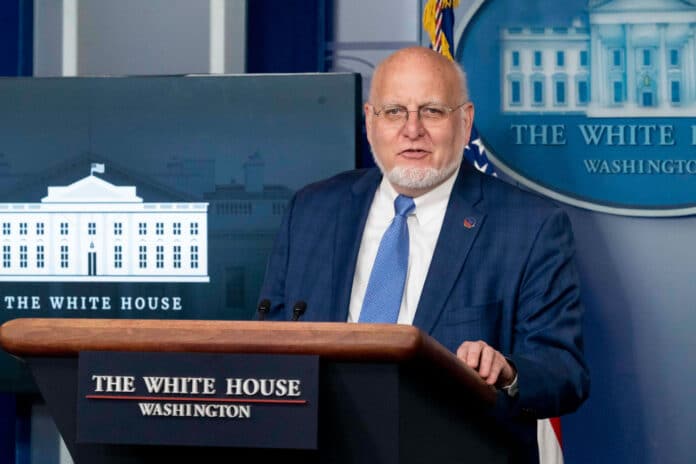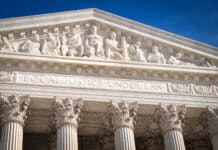(The Daily Signal) — The House on Wednesday held its first hearing investigating the origins of COVID-19 after two federal agencies suggested the pandemic likely began when a new coronavirus escaped China’s Wuhan Institute of Virology.
The Energy Department recently assessed, albeit with “low confidence,” that the virus originated in the Wuhan lab, while FBI Director Christopher Wray also has confirmed his agency’s assessment that COVID-19 most likely originated from a lab incident in Wuhan.
Here are six highlights from testimony before the House Oversight and Accountability Committee’s subcommittee on the pandemic.
1. What’s ahead?
Rep. Brad Wenstrup, R-Ohio, chairman of the select subcommittee, provided a glimpse of what his panel will delve into during future hearings.
Wenstrup said the subcommittee sent letters of inquiry to the White House, the Department of Health and Human Services, the Office of the Director of National Intelligence, the Department of Energy, the FBI, and the State Department.
The subcommittee also wrote to Dr. Francis Collins, former director of the National Institutes of Health, and Dr. Anthony Fauci, former director of the National Institutes of Allergies and Infectious Disease, both of whom may have to testify.
The panel also is seeking information from the EcoHealth Alliance, a nonprofit that worked with the Wuhan lab and received about $600,000 in NIH grants.
“Unfortunately the question of the origins [of COVID-19] has been politicized,” Wenstrup said. “That’s no secret. It has driven most people to their corners, rather than driving apolitical scientific debate or discussion.”
2. ‘No doubt’ US tax dollars funded gain-of-function research
The key witness was Dr. Robert Redfield, who was director of the Centers for Disease Control and Prevention in the Trump administration when the pandemic emerged.
Redfield was among the earliest government officials to say the virus likely came from the Wuhan lab.
Rep. Nicole Malliotakis, R-N.Y., brought up that Fauci testified under oath during a Senate hearing in 2021, under questioning from Sen. Rand Paul, R-Ky., that there was no U.S. funding for gain-of-function research in China.
The term “gain of function” describes a risky process of making a disease more dangerous or contagious for the purpose of studying a response.
“Do you think that Dr. Fauci intentionally lied under oath to Sen. Paul when he vehemently denied NIH’s funding of gain-of-function research?” Malliotakis asked Redfield.
Redfield responded: “I think there is no doubt NIH was funding gain-of-function research.”
The former CDC director didn’t address whether Fauci was truthful under oath.
Malliotakis then asked: “Is it likely American tax dollars funded the gain-of-function research that created this virus?”
Redfield responded yes, but that the NIH wasn’t the only factor.
“I think it did, not only from the NIH but the State Department, from USAID, and from DOD,” Redfield said, referring to the U.S. Agency for International Development and the Department of Defense.
At another point, Wenstrup asked: “Has gain-of-function research created any lifesaving vaccines or therapeutics, to your knowledge?
Redfield: “Not to my knowledge.”
The subcommittee chairman then asked: “Has gain-of-function research stopped a pandemic, in your opinion?”
Redfield: “No, on the contrary, I think it probably caused the greatest pandemic our world has seen.”
Wenstrup: “Do you find any tangible benefits to gain-of-function research, at this time?”
Redfield was careful not to impugn anyone’s motives, including Fauci’s.
“I personally don’t,” the former CDC chief replied, “but I do want to stress I think the men and women that support it are people of good faith because they truly believe it’s going to lead to potential benefit. I just disagree with that assessment.”
3. ‘Three things happened in that lab’
Wuhan Institute of Virology officials deleted chronological logs of past research data, put the lab under military control, and redid the ventilation system in fall 2019, months before the rest of the world became aware of a new coronavirus and COVID-19, Redfield noted.
Rep. Debbie Lesko, R-Ariz., asked Redfield: “Do you believe that we can have certainty that the virus did not come from the Wuhan lab, and that U.S. funding was not used for COVID-19-related research?”
Redfield responded that the public can read recently unclassified information that shows those in charge of the Wuhan lab engaged in unusual conduct.
“The declassified information now shows in September 2019, three things happened in that lab,” Redfield said.
“One is they deleted the sequences,” he said, referring to sequencing, a laboratory technique used to determine the exact order of nucleotide bases, which compose individual genomes.
“That’s highly irregular. Researchers don’t usually like to do that.”
“The second thing they did is they changed command and control of the lab from civilian control to military control. Highly unusual,” Redfield said.
“The third thing they did, I think is really telling, is they let a contractor redo the ventilation system in that laboratory,” Redfield added. “So, I think clearly, there is strong evidence that a significant event happened in that laboratory in September. It has now been declassified. You can read it.”
4. ‘Donald Trump’s culpability’
Rep. Jamie Raskin, D-Md., ranking member of the full House Oversight Committee, argued that regardless of the origins of the pandemic, it happened on former President Donald Trump’s watch.
“Whatever the origins of COVID-19, whether it is bats or bureaucrats, no finding will ever exonerate or rehabilitate Donald Trump for his lethal recklessness in mismanaging the crisis in America, which cost us more than 1 million lives,” Raskin said.
The Maryland Democrat, a harsh Trump critic, led House case managers during Trump’s second Senate impeachment trial. He also voted against certifying Trump’s 2016 victory over Democrat Hillary Clinton in the presidential election.
“Indeed, if COVID was the product of a lab leak or the worst bioweapon of mass destruction ever invented — as some have argued, and obviously we don’t have the scientific evidence to say any of this yet — it would not only not remove Donald Trump’s culpability, it would only deepen his culpability in the most profound way,” Raskin said, adding:
“Why do I say that? Because over the course of the crisis, beginning in January of 2020 and lasting through the spring, on more than 42 different occasions that we have identified so far, President Trump openly praised and defended the performance of Communist Party Secretary and Chinese President Xi [Jinping] in his handling of COVID-19, and both boasted of how close they were working together and boasted of Xi’s openness and transparency.”
5. ‘Bunch of yokels are eating bats’
The lone witness called by the panel’s Democrats — Dr. Paul G. Auwaerter, clinical director for the division of infectious diseases at Johns Hopkins University School of Medicine — stuck to his guns.
“I think it is more likely, at the moment, just based on my reading, a zoonotic, that is an animal-based [virus],” said Auwaerter, a former president of the Infectious Diseases Society of America.
Rep. Debbie Dingell, D-Mich., asked Auwaerter: “Is it normal for different agencies within the intelligence community to make different assessments of one origin theory over the other?”
“Very few things we know for certain,” Auwaerter responded.
“I understand, just reading the newspapers, that the CIA hasn’t made any determination,” he said. “Others have come to different levels of conclusions. So it seems to me there is a difference of opinion.”
However, much of the evidence seemed clear to another Democrat, Jamie Metzl, a senior fellow at the Atlantic Council who once worked for the Clinton administration’s National Security Council and for Joe Biden’s Senate office.
“China must be the primary focus,” Metzl told the lawmakers. “If we make it primarily about Dr. Fauci, we will be inappropriately serving the Chinese government a propaganda tool on a silver platter.”
Metzl called himself a “lifelong Democrat” and “progressive person.”
“But I kept digging,” he said. “I couldn’t find the justification for these strong arguments, calling people like me — looking into pandemic origins in good faith — conspiracy theorists,” Metzl said.
“A lot of Americans had this vision of Wuhan as some little market town where a bunch of yokels are eating bats for dinner every night,” Metzl said. “But Wuhan is China’s Chicago. It’s an incredibly sophisticated, highly educated, wealthy city.”
6. ‘Antithetical to science’
Fauci, who became the face of the nation’s fight against COVID-19, has said that “attacks on me quite frankly are attacks on science.”
However, Redfield said actions taken by Fauci and other officials to shut down discussion of the pandemic was “antithetical to science.”
Asked whether he thought Fauci was trying to hide his role in gain-of-function research that produced the new coronavirus, Redfield said he couldn’t speak for Fauci. But the former CDC director said federal officials’ activities undermined scientific inquiry.
“This whole approach that was taken on Feb. 1 [2020] and subsequently in the month of February, if you really want to be truthful, it’s antithetical to science,” Redfield told the lawmakers. “Science has debate. They squashed any debate.”
Last weekend, the House Oversight and Accountability Committee released new evidence suggesting that Fauci prompted the drafting of a paper on the “proximal origin” of the virus, published as a letter in the journal Nature in March 2020. The goal of that publication, Republican lawmakers suggested, was to disprove the theory that a lab leak led to the pandemic.
Early in the hearing, Wenstrup said the authors skewed available evidence to achieve that goal.
“Do you think that the paper hides the truth?” Malliotakis asked Redfield.
Trump’s CDC director explained that the report was supposed to advance a “narrative.”
“I think it is an inaccurate paper that basically was part of a narrative that they were creating,” Redfield said. “Remember, this infection did not start in January in a [Chinese] seafood market. We know now there were infections going all the way back to September.”
“This was a narrative that was decided, that they were going to say this came from the wet market, and they were going to do everything they could to support it, to negate discussion about the possibility that this came from a lab.”
In January 2020, Redfield urged NIH and World Health Organization officials to investigate both the possibility of a lab leak and an animal at the wet market as the first source of the virus. After that, he was excluded from conferences among other public health officials, including emails and phone calls.
“I also expressed that as a clinical virologist, that I felt it was not scientifically plausible that this virus went from a bat to human and became one of the most infectious viruses we have in humans,” Redfield said.
“Why do you think you were excluded from those calls?” Malliotakis asked.
Redfield responded: “Because it was told to me [that] they wanted a single narrative, and that I obviously had a different point of view.”

















